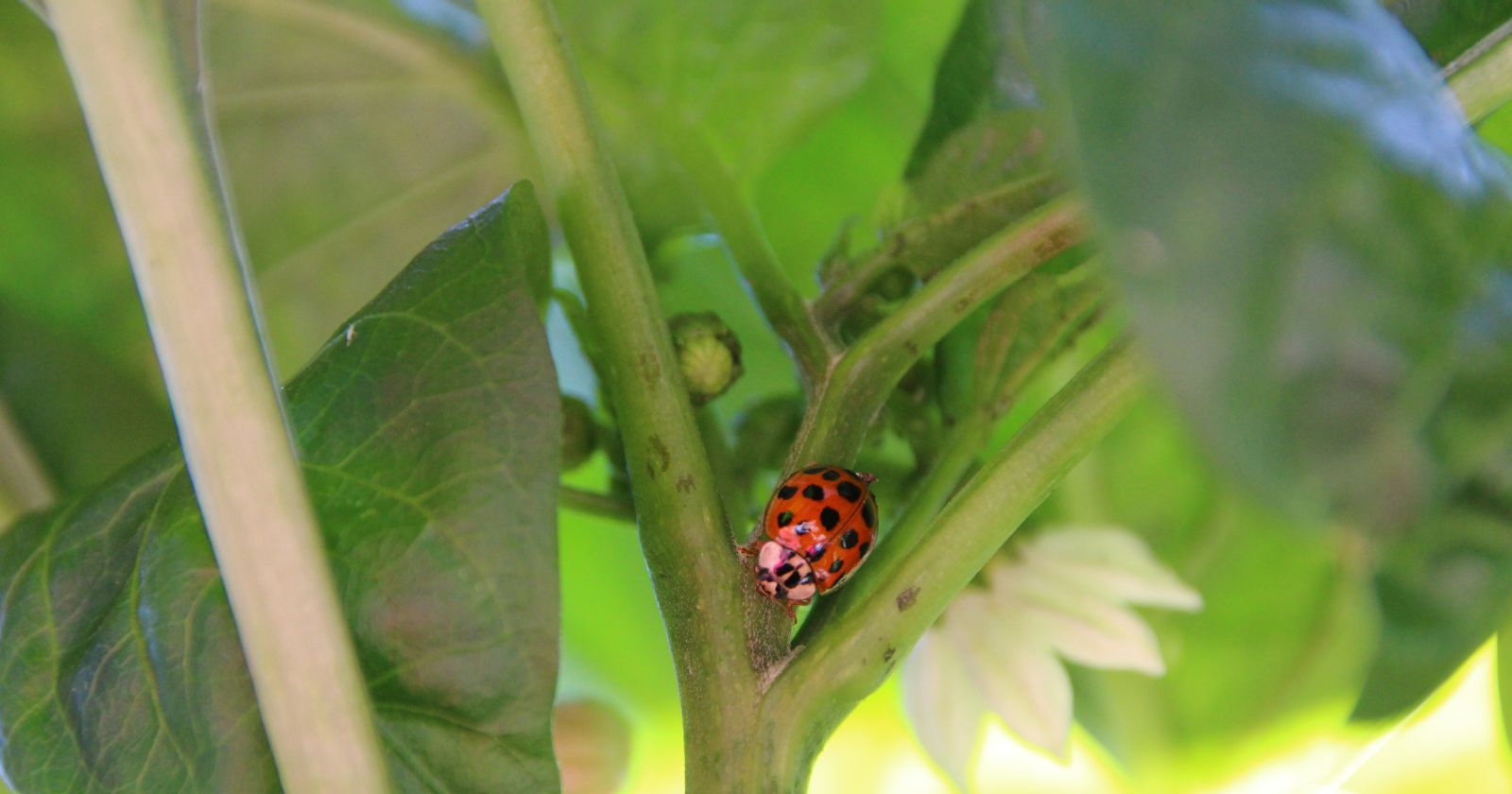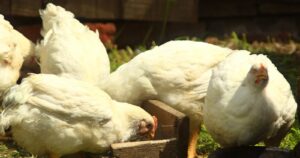If you’ve ever grown peppers, you know they are not only delicious but also challenging to cultivate. One of the biggest obstacles pepper growers face the threat of animals who love to feast on their plants.
It can be frustrating to spend all the time and effort growing a beautiful pepper plant, only to have it destroyed by a hungry critter. But don’t worry; there are ways to protect your harvest!
Several animals eat pepper plants, including slugs, snails, squirrels, caterpillars, white flies, rabbits, deer, hornworms, gophers, and groundhogs. Pepper weevils and thrips may also feed on pepper plants.
This article will discuss each of these predators and provide tips on protecting your plants from their destruction.
So let’s dive in and learn how to preserve your pepper plants from predators! From physical barriers to natural deterrents, we’ve got you covered.
Common Predators Of Pepper Plants
Pepper plants are sought after by many insects and animals, making them vulnerable targets in gardens and farms. The most common predators of pepper plants are plant lice, worms, moth caterpillars, beetles, spider mites, slugs, snails, tomato hornworms, white flies, rabbits, deer, and cutworms.
These pests can damage pepper plants’ leaves, stems, and fruits, affecting their growth and yield.
- Plant lice, also known as aphids, are tiny insects that feed on the sap of pepper plants. They reproduce quickly and can cause stunted growth and curling of the leaves.
- Worms, such as armyworms and cutworms, are caterpillars that eat through the stems of pepper plants, causing them to wilt and die.
- Beetles, including the flea and the Colorado potato beetle, feed on the leaves of pepper plants, leaving behind small holes and damage.
- Spider mites are tiny pests that spin webs on the leaves of pepper plants, causing them to turn yellow and dry out. Slugs and snails are common predators that leave behind slimy trails and chew through the leaves and fruits of pepper plants.
- Tomato hornworms are large caterpillars that feed on the leaves and fruits of pepper plants, causing extensive damage.
- Whiteflies, on the other hand, suck the sap from the leaves of pepper plants, causing them to turn yellow and fall off prematurely.
- Rabbits and deer are larger animals that can cause significant damage to pepper plants. They feed on the leaves and stems, leaving behind chewed-off parts and sometimes uprooting the entire plant.
- Cutworms are larvae of various moth species that feed on the roots of pepper plants, causing wilting and death.
Despite the threat posed by these pests, some natural predators can help control their populations. Lady beetles, green lacewings, damsel bugs, and hoverfly larvae are beneficial insects that consume aphids and other pests.
Slugs And Snails: How To Protect Your Pepper Plants
Slugs and snails love to munch on pepper plants – but fear not! There are several natural ways to protect your plants from these pesky critters.
A thin layer of ground eggshells, coffee grounds, or garlic can be a natural deterrent. And if you’re feeling creative, try using cloches or bottomless plastic bottles to keep them away physically.
By planting in well-draining sites in full sun or using other natural methods like diatomaceous earth, beer traps, chickens or ducks, or rosemary, you can rest easy knowing your peppers are safe and sound.
But what exactly makes slugs and snails so attracted to pepper plants in the first place? Well, these slimy creatures are drawn to the moist and shady conditions that pepper plants tend to thrive in.
In addition, pepper plants are rich in nutrients, making them a tasty treat for snails and slugs looking for a meal.
By understanding these factors, you can take steps to create an environment that is less appealing to slugs and snails – and more attractive to your beloved pepper plants.
One standard method for protecting pepper plants from slugs and snails is to use physical barriers like plastic bottles or cloches. However, another option is to simply plant companion herbs or vegetables that slugs and snails tend to avoid.
For example, rosemary, mint, and garlic are all known to be natural deterrents for these critters. Integrating these plants into your garden can create a natural barrier that helps protect your pepper plants from harm.
Squirrels: Keeping Them Away From Your Garden
Squirrels are cute little creatures, but they can be a big problem for your garden. They love to feast on plants, especially pepper plants.
If you’re wondering how to keep squirrels away from your garden, we have a few solutions. Essential oils like peppermint, geranium, or clove are practical options that squirrel dislike.
Also, cayenne pepper, ground chili peppers, or pepper flakes sprinkled on your plants are good natural alternatives.
You could use metal mesh barriers around your garden or use motion-activated sprinklers, fake owls, snakes, or ultrasonic devices emitting high-frequency sounds for humane deterrence.
Keep reading to learn more about squirrels and keep them away from your garden. Here are some information to help you out:
Physical Barriers:
The metal mesh is an effective material to keep squirrels away. Using a fine mesh strong enough to hold up against squirrels is essential. You could also create a fence around your garden, but ensure it’s tall enough to prevent squirrels from jumping over it.
Another method is to place netting over your plants, which protects them from squirrels and other animals. However, you’ll need to secure the netting tightly to the ground to prevent squirrels from getting under it.
Homemade Repellents:
You can use a few household items to make your natural squirrel repellent. One option is to mix vinegar, water, and cayenne pepper and spray it around your garden. Another is to crush garlic, mix it with water, and apply it to your plants.
You can also use blood meal, a dried blood fertilizer, as a repellent. Sprinkle it around the perimeter of your garden or on your plants.
Plant Selection:
Another way to keep squirrels away from your garden is to choose plants they dislike. Squirrels dislike herbs like sage, rosemary, and thyme and plants like daffodils, alliums, hyacinths, and fritillaries.
Planting these around your garden can help deter squirrels from coming near your other plants. You could also try planting marigolds, which have a scent that squirrels dislike.
Caterpillars And White Flies: Natural Remedies To Repel Them
Caterpillars and white flies can be a real threat to your plants, but there are some natural remedies that can help you keep them at bay.
Some great plants can help repel white flies, including dill, catnip, bee balm, basil, and chives. If you’re dealing with white flies, try mixing water with liquid dish soap – this simple solution works wonders.
Or you can use neem oil, an all-natural remedy effective against other garden pests. Try these natural remedies, and you’ll soon see a noticeable difference in your garden.
Bacillus thuringiensis (Bt) is another effective option for removing caterpillars. Naturally occurring bacteria will kill the caterpillars without harming other beneficial insects or humans.
You could also try companion planting with marigolds, petunias, and nasturtiums, all known to repel caterpillars. These plants can help keep your garden healthy and pest-free while adding a touch of color and beauty.
Prevention is vital for keeping caterpillars and white flies at bay. Look for any signs of infestation, such as yellowing or spotted leaves, and take action as soon as you notice any problems.
Keep your plants healthy and well-fed, and water them regularly. Practice good garden hygiene by removing any dead or diseased leaves, as these can attract pests. And remember, a healthy garden is a sunny garden.
Rabbits, Deer, Gophers, And Groundhogs: Physical Barriers For Your Garden
Rabbits, deer, gophers, and groundhogs can cause havoc in your garden by munching on your precious plants. Physical barriers can be a reliable solution to keep them from chomping on your pepper plants. Here’s a breakdown of what to do for each of these critters:
Rabbits and Groundhogs:
The simplest solution for keeping these pests out of your garden is by installing a fence around the perimeter of your garden. Make the fence at least 2 feet high for rabbits and include a 30-inch underground section for groundhogs to keep them from digging underneath.
You can use hardware cloth or chicken wire mesh to create the fence. Keeping the wall tight and upright is essential to prevent rabbits from squeezing through gaps.
Deer:
Deer can be harder to deter than rabbits and groundhogs, but there are still ways to protect your garden. You can plant deer-resistant plants, such as marigolds, or install a fence or netting.
An 8-foot high fence may be necessary to keep out deer, but a lower wall of 4 to 5 feet will work if you run an electric wire along the top. Alternatively, you can rig up a streamer of shiny material on a pole to scare them away.
Gophers:
Gophers can be thwarted by planting in raised beds with hardware cloth at the bottom to prevent burrowing. You can also use wire mesh baskets around the roots of your plants. The baskets keep the gophers out while allowing plant roots to grow freely.
A mixture of chili powder and garlic sprayed on plants can also deter gophers but be sure to wash vegetables thoroughly before eating.
Hornworms: Identifying And Controlling Their Damage To Your Pepper Plants
Hornworms can be a nightmare for your pepper plants, causing significant damage that can leave your plants leafless and wilted. Signs of hornworm damage are pretty easy to spot, from missing leaves to droppings on leaves.
The good news is that there are ways to control these pesky worms before they do too much damage. Let’s look at identifying and managing hornworms on your pepper plants.
Identifying Hornworms:
- Look for missing leaves and wilted leaves hanging down on the verge of giving up
- Check for dark green droppings on leaves
Controlling Hornworms:
- Use insecticidal soap to kill smaller worms
- Remove them by hand
- Use companion planting with plants such as basil, marigolds, or dill to lure them away from your pepper plants
- Use Bacillus thuringiensis (Bt), a natural bacteria that kills caterpillars but does not harm beneficial insects or humans
Insecticidal soap is an excellent option for controlling hornworms on your pepper plants, especially for smaller worms. Just spray the soap directly onto your plants to kill the worms. You can also use this method on other pests, like aphids or spider mites.
Removing the worms by hand is another option, but it can be time-consuming. However, it’s a great way to ensure you’re getting all the worms without accidentally harming beneficial insects.
Companion planting can also be effective when trying to control hornworms. Planting marigolds, for example, near your pepper plants can help repel the worms.
Bacillus thuringiensis (Bt) is another excellent way to control hornworms without harming other beneficial insects or humans. This natural bacteria is found in the soil and can be sprayed onto plants to kill the worms.
Pepper Weevils And Thrips: Prevention And Treatment Methods
Pepper weevils and thrips can be a major headache for pepper farmers. These pests can cause significant damage to pepper plants, potentially destroying entire crops.
So, how can you prevent and treat pepper weevils and thrips? Let’s dive in.
To prevent pepper weevils, it’s essential to start controls at first bloom to avoid an early pest build-up. Consider using insecticide sprays targeting adults and getting them on the foliage and flowers.
This can be an effective way to control the population of pepper weevils and prevent them from causing damage to your pepper plants.
Thrips can also be a significant issue for pepper farmers. One of the best ways to prevent thrips is by regularly inspecting and monitoring your plants to detect their presence. If you do find thrips, there are a few different treatment methods you can consider.
For example, treating seedlings and transplants with imidacloprid before placement in the field and at planting can be effective.
The focus of management for thrips is not necessarily on killing the maximum number of pests but instead on preventing damage. You can consider a few different prevention methods, including removing weeds and grass, encouraging beneficial predators, and using sticky traps to catch adult thrips.
Additionally, some farmers have succeeded with reflective mulch, which can help repel thrips and other pests.
Natural Deterrents: Attracting Beneficial Insects To Protect Your Crops
Answering what animals eat pepper plants is crucial in understanding how to protect your crops. Insects like aphids, spider mites, and caterpillars can wreak havoc on your plants. Still, a natural and effective way to deter them is by attracting beneficial insects to your garden.
The first thing to do is to choose your insecticides and immediately stop using chemical pesticides carefully. These can harm the harmful and beneficial insects in your garden.
Instead, plant nectar-rich flowers such as fennel, Alyssum, and dill to attract the likes of ladybugs, lacewings, and parasitic wasps – all of which are effective in controlling pests.
Alongside planting nectar-rich flowers, employing other natural pest control methods is essential. Dish soap, vegetable oil, diatomaceous earth, pyrethrins, hot pepper spray, and beer can be deterrents.
Each technique serves a specific purpose; some may work better than others for particular pests.
One way to maximize the benefits of natural pest deterrents is by implementing companion planting. This involves planting different crops that mutually benefit one another.
For instance, planting basil next to tomato plants can protect the latter from aphids, enhancing the basil’s flavor.
You can protect your crops and maintain a healthy garden ecosystem by attracting beneficial insects and practicing natural pest control methods. Not only is this an environmentally friendly solution, but it can also save you time and money on costly insecticides.





